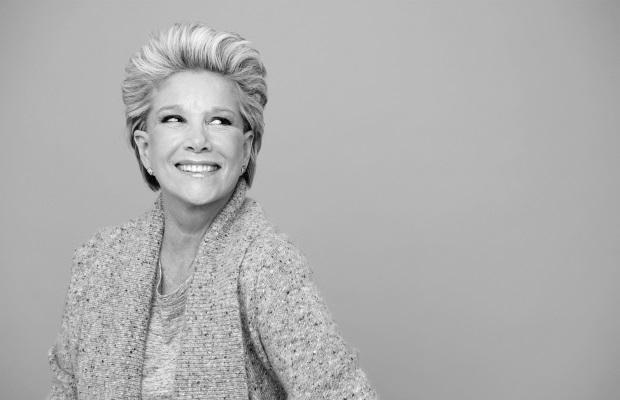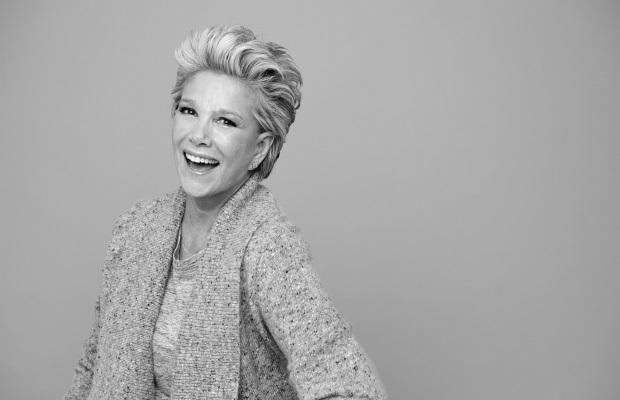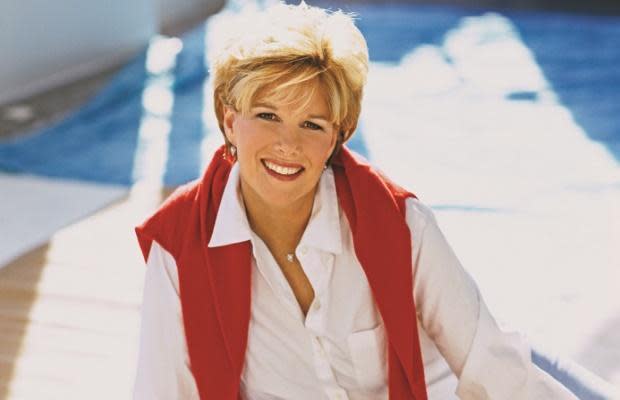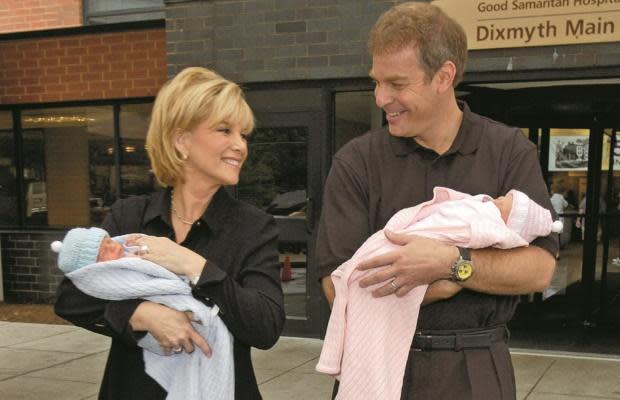What Life Is Really Like After Breast Cancer: Joan Lunden Gets Personal

(Photo: Andrew Eccles)
When the sunniest woman in the history of morning news got hit with triple-negative breast cancer at age 63, her life changed, irreversibly. A year after finishing treatment, Joan Lunden says she’ll never be her old self, but that her new normal is filled with revelations, joy, and yet another amazing reinvention.
Perfection is really irritating, especially first thing in the morning. Which may be why for 20 years, Joan Lunden was so beloved as Good Morning America’s cohost. Sunny and soothing if you tuned in before your caffeine hit, she nevertheless distinguished herself by not being perfect. Though always beautiful, she struggled with weight, went through a very public divorce, and juggled kids and family like the rest of us. But she was always game, a supremely cheerful enthusiast—whether she was interviewing a president or bungee-jumping off a bridge. Lunden was also an outspoken advocate for women’s health issues before they were the fodder for every morning television show. (Want to pick up some healthier habits? Sign up to get daily healthy living tips delivered straight to your inbox!)
Yet none of this prepared her for a diagnosis of triple-negative breast cancer, a particularly insidious form of the disease, which demanded 9 months of aggressive treatment: a lumpectomy, radiation, and 16 rounds of chemotherapy. Diagnosed in 2014, she is now cancer-free and crisscrossing the country speaking to health organizations and raising awareness. But I realized, as we sat down to talk, that behind the rainbows and unicorns she sometimes espouses in her speeches, Lunden is a vulnerable woman, wife, and mother who is still struggling to come to terms with life after cancer—what she calls the “new normal.”
Today, you’re celebrating more than a year of being cancer-free—you look great, but how do you feel?
You know, the time after treatment can sometimes be more emotionally difficult than during treatment. At least during, you’ve put yourself in the hands of these doctors, and everyone’s doing everything they can, you’re taking medication, and you’re fighting. Then, all of a sudden one day, they say, “OK, bye!” And you walk out the door and—well, I know I’m not alone in this, but I was an emotional basket case.
Describe to me what it was like when chemo was over and you had your very last radiation treatment.
My husband, Jeff Konigsberg, took me to get a necklace with a little pink stone that I’ve worn most days since. So that was like a little “let’s celebrate.” But I thankfully had been warned by the nurses that while everyone thinks you want to go celebrate, it’s interestingly and oddly emotionally difficult. They were right. I cried like a baby.
Related: Are You Bummed Out…Or Depressed?
Because you’re thinking, What happens next?
Right. You can’t help but say, “Did we get it all?” Now am I just sitting around waiting for the other shoe to drop? Can you ever really feel safe and secure again? Cancer is not something that you get and get cured and never worry about again. It really isn’t.
You certainly haven’t talked about the “gift” of cancer, but you’ve talked about the silver linings. What are they?
Cancer reconnected me with my father. He was a cancer surgeon and died in a plane crash when I was 13. I realized that my dad’s light had been taken before his time and he had so much left to do. And that I was now in a position where I could pick up his legacy and carry on. That was meaningful to me—it was therapeutic, healing.

(Photo: Andrew Eccles)
How has having cancer changed you?
I’m not the same person I was 2 years ago. For one thing, I was always preaching to people about making healthy lifestyle choices, and it really took kind of getting hit between the eyes with a two-by-four to change my life—to really read food labels, for example. I’ve always been so driven, but now I’m stopping to ask myself about every venture, Am I expending too much work for not enough reward? I’ve just gone through very aggressive chemotherapy, and it really does take a toll on your body, there’s no getting around it.
What’s the toll?
My energy level, my physical capability is lower: I have to really be patient and work to get that back. I said the other day, “I’m not back to my old self"—and then I realized, I may never get back to my old self. Maybe there’s just your new self, your new reality, your new normal. And you make that new normal as good as it can be.
Related: 7 Reasons You’re Tired All The Time
You often call yourself a "glass-half-full kind of girl.” But certainly this diagnosis must have been an incredible challenge to maintaining that attitude. Was there a point where you asked, “Why me?”
Never. It didn’t even occur to me. I’ve been taken to task on social media for talking about how important it is to have a positive attitude. And it’s usually people who have metastatic breast cancer, and they know they’re going to die, and you know, “Positive attitude isn’t going to cure us.”
But a positive attitude will certainly make the time you’re here on Earth more palatable and will certainly keep the fight in you to keep fighting to live until maybe we even find a better treatment for you. It will keep that fight stronger. There have been studies that show that patients who have a positive attitude and are optimistic have a better immune system, and they heal better, they recover better.

(Photo: Andrew Eccles)
This reminds me of the song you once said was your anthem: Carole King’s “Beautiful.”
Yes, I’ve tried to live those words: “You’ve got to get up every morning / with a smile on your face /and show the world / all the love in your heart.”
And now it seems you’ve taken that love and are turning it toward other women with your advocacy work.
I have considered it one of those odd gifts from above that you get an opportunity to help other people go through dire diagnoses. Maybe by telling my story, I make women more vigilant. I know that I was a person who paid lip service to self-exams—but come on, let’s be honest, I didn’t do them. And I didn’t think I needed to because I didn’t have a family history. So breast cancer was someone else’s worry.
Related: 10 Cancer Symptoms Most People Ignore
Right. It’s like, Something will get me, but not THAT!
Yes. Now that it’s happened to me, I guess I feel compelled to go out there and warn other women and make them more aware and make them more vigilant. And understand it’s not just about family history. It’s about the lifestyle choices that we make: whether or not we exercise, what we’re consuming, our stress levels, our lack of sleep. And all the other risk factors that can make us susceptible not only to breast cancers but all the other cancers.
But…surely you don’t blame yourself for getting cancer.
There is a certain sensibility of, How could I not have known? You know, I was such a health advocate.
But you really did lead a healthy life, particularly compared with the average American.
I hear people all the time say that I did everything right. However, there are other risk factors we don’t even think about that are kind of a factor of American life. We get married later, so we have children later. Well, if you have children after 30, that’s a risk factor. There are many women today who have trouble getting pregnant, so they have fertility treatments. That’s a risk factor. I took birth control pills for years—yes, I did. So I did IVF—yes, I did. So I had children late—yes, I did.
Related: 10 Things To Never Say To Someone With Cancer
But your cancer was triple negative, meaning you did not have receptors for the hormones in the hormone therapy drugs, so it couldn’t have been fueled by the therapy. But OK, would you really have not taken HT?
I don’t know. Can I really say that I wouldn’t have? Let’s face it, you do it for all these reasons…to stay vibrant, to not have hot flashes.

(Photo: Andrew Eccles)
Are you still off sugar, wheat, and dairy like you were during your treatment?
I’m not as strict as I was because going on a restrictive diet during treatment meant that I didn’t have a lot of the crummy side effects of chemotherapy. I went bald, but I didn’t lose my fingernails, I wasn’t throwing up all the time. But now, it’s very difficult when you’re living in a house with two 10-year-olds and two 12-year-olds. I’m not an all-or-nothing person. I have to live with some compromises in order to live congenially with my family.
You seem so much younger than you are, and I don’t mean just in looks. Do you have an age you are in your head?
Forty-five! I can’t wrap my brain around the fact that I’m 65. To me that’s totally not possible. I wear leggings and boots! I work out and climb mountains! I’m a young person! But of course, if you ask anyone, “What is a senior person?” that answer is: 15 years older than you are.
And it probably helps that you’re married to someone 10 years younger.
Here’s something: When I was 29 years old, I got married to a guy who was 39 years old. We had three kids, but our likes and life were so disparate. You know, like, he wanted to go to jazz clubs and I wanted to go to a Pearl Jam concert. We were just so different, and so we got divorced. Twenty years later, I got married again when I was 49—and again I married a guy who was 39. Again.
Related: 10 Little Things Connected Couples Do
That age is the sweet spot for you.
Yes. And the second time worked out much better.
So you’re married to a man 10 years younger, and you had two sets of twins, by surrogacy, in your 50s. Do you think something about the way we perceive age has changed?
We used to think that at 50 years old you were over the hill, and at 60 you retired, and you were probably dead at 70 or 75. Well, guess what: The average life expectancy of a woman is around 85 and men a few years younger. If we’re going to be living 20 to 30 years longer than previous generations, isn’t it that much more important to invest in our health? Like, who wants the extra 30 years if you’re going to have chronic illness and you’re going to feel horrible?
America hasn’t embraced this yet. Prevention is the one thing within our power, within our reach. And yet it’s easier to just say, “Well, you know, it’s destiny.” It’s not destiny. We predetermine our longevity by the life choices and the health choices we make today.
What other emotional factors have played a role in your recovery?
For the first 40 years of my life, I was incredibly shallow! I didn’t really introduce my real self to my spiritual side until I turned 40 and decided to take care of my health and change my life. I lost about 40 pounds, changed how I ate, and added exercise to my life. And I don’t think it’s that unusual for people who take control of their body on the outside to look for change on the inside. What if I could be more peaceful, more mindful? That’s where spirituality entered my life.

(Photo: Andrew Eccles)
How does mindfulness help you control your reactions to stress, fear, and anger?
I think most people believe how you react to events is not a choice. But you do have a choice. A simple example: Sometimes when I’m driving and I get all stressed out about something, I’ll say, Wait a second. Do you really want to go there?
Certainly one event that could have sparked a reaction was losing your hair. Do you still have the hair you buzzed off before chemo?
Yes! It’s in a piece of tinfoil in the back of my drawer. I can’t explain why I saved that hair. I also have all my wigs.
Related: Why The Heck Is My Hair Falling Out?
You’ve kept the wigs?
It’s too fresh. Too recent. Too real. Too unbelievable to be able to give them away and feel comfortable with that.
Do you still keep a journal?
Yes. I’ve done that for years. And I always title my journals.
What’s your latest one called?
“I Will Survive.”
So does that mean your anthem has changed from “You’ve got to get up every morning with a smile on your face”?
Now I think it’s “Fight Song"—it’s the song played at all breast cancer events. I’ve done 15 breast cancer events in the past few weeks, and I’ve always walked out on stage to that song. [This is my fight song / Take back my life song / Prove I’m all right song / My power’s turned on / Starting right now I’ll be strong]
I just met the artist, Rachel Platten. It’s a song that can mean something different for everyone, but she told me, "I worked for 16 years to try to make a career in music, and I’d just about given up, and then I wrote that song. I still have the fight left in me.”
And I put my arms around her and said, “Do you have any idea of how much you have empowered women battling breast cancer?” And both of us were in tears.
Related: 10 Things Your Breasts Say About Your Health
The Many Reinventions of Joan Lunden
20s:

(Photo: Micheal Ochs Archives/Getty Images)
While her peers stressed about finals, Lunden spent her last year of college building her future. “I opened a modeling school, because it was something I could do,” she says. Then-20-something Lunden put on fashion shows—and still finished her homework.
30s:

(Photo: Joe McNally/Getty Images)
Lunden caught her big break as a feature news and consumer reporter for Good Morning America in 1976. Four years later, she jumped to GMA cohost and became a household name to her devoted viewership. “I was in their living rooms for 2 decades,” she says. “And I’ve shared a lot of my personal life with them.”
40s:

(Photo: George Holz/Getty Images)
After she left GMA in 1997, the 47-year-old mom of three spent 2 years traveling with motivational speaker Tony Robbins and speaking to crowds of 20,000, despite her fear of public speaking. “My chest got red and rashy, and I would get a stomachache,” she says. “But I turned a total fear into a passion.”
50s:

(Photo: L. Busacca/Getty Images)
By the time she reached 50, Lunden had married a man 10 years her junior and raised three daughters from her previous marriage—but she wanted more. Through the help of a surrogate mother, Lunden and her husband welcomed a set of twins in 2003 and another set in 2005.
60s:

(Photo: Ruven Afanador/Corbis Outline)
In June 2014, at 63, Lunden heard three scary words, “You have cancer.” After 9 months of aggressive treatment to rid her body of breast cancer cells and two tumors, Lunden’s disease went into remission. She still lives with the worry it’ll come back. “Cancer is not something that you get and get cured and never worry about again,” she says. “It really isn’t.”
Now:

(Photo: Courtesy of Joan Lunden)
Even through 16 rounds of chemotherapy, Lunden stayed upbeat and positive. Now, having beaten her cancer, she’s found a new purpose in life—to support and empower women facing breast cancer. “I feel compelled to go out there and make other women more aware and vigilant.”
By Judith Newman
This article ‘What Life Is Really Like After Breast Cancer—Joan Lunden Gets Personal’ originally ran on Prevention.com.

